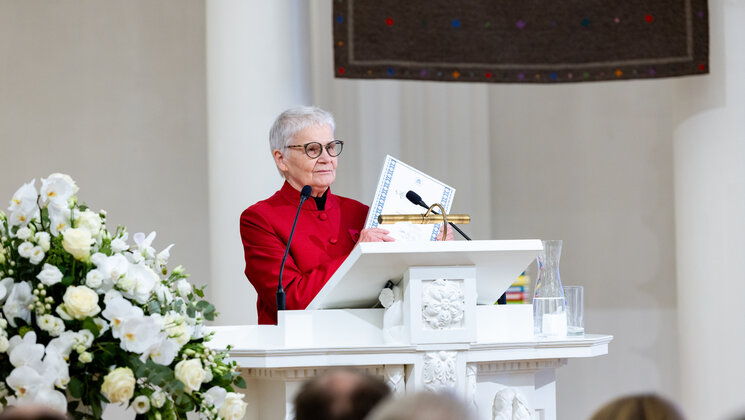-
Faculty of Arts and HumanitiesDean's Office, Faculty of Arts and HumanitiesJakobi 2, r 116-121 51005 Tartu linn, Tartu linn, Tartumaa EST0Institute of History and ArchaeologyJakobi 2 51005 Tartu linn, Tartu linn, Tartumaa EST0Institute of Estonian and General LinguisticsJakobi 2, IV korrus 51005 Tartu linn, Tartu linn, Tartumaa EST0Institute of Philosophy and SemioticsJakobi 2, III korrus, ruumid 302-337 51005 Tartu linn, Tartu linn, Tartumaa EST0Institute of Cultural ResearchÜlikooli 16 51003 Tartu linn, Tartu linn, Tartumaa EST0Institute of Foreign Languages and CulturesLossi 3 51003 Tartu linn, Tartu linn, Tartumaa EST0School of Theology and Religious StudiesÜlikooli 18 50090 Tartu linn, Tartu linn, Tartumaa EST0Viljandi Culture AcademyPosti 1 71004 Viljandi linn, Viljandimaa EST0Professors emeritus, Faculty of Arts and Humanities0Associate Professors emeritus, Faculty of Arts and Humanities0Faculty of Social SciencesDean's Office, Faculty of Social SciencesLossi 36 51003 Tartu linn, Tartu linn, Tartumaa EST0Institute of EducationJakobi 5 51005 Tartu linn, Tartu linn, Tartumaa EST0Johan Skytte Institute of Political StudiesLossi 36, ruum 301 51003 Tartu linn, Tartu linn, Tartumaa EST0School of Economics and Business AdministrationNarva mnt 18 51009 Tartu linn, Tartu linn, Tartumaa EST0Institute of PsychologyNäituse 2 50409 Tartu linn, Tartu linn, Tartumaa EST0School of LawNäituse 20 - 324 50409 Tartu linn, Tartu linn, Tartumaa EST0Institute of Social StudiesLossi 36 51003 Tartu linn, Tartu linn, Tartumaa EST0Narva CollegeRaekoja plats 2 20307 Narva linn, Ida-Virumaa EST0Pärnu CollegeRingi 35 80012 Pärnu linn, Pärnu linn, Pärnumaa EST0Professors emeritus, Faculty of Social Sciences0associate Professors emeritus, Faculty of Social Sciences0Faculty of MedicineDean's Office, Faculty of MedicineRavila 19 50411 Tartu linn, Tartu linn, Tartumaa ESTInstitute of Biomedicine and Translational MedicineBiomeedikum, Ravila 19 50411 Tartu linn, Tartu linn, Tartumaa ESTInstitute of PharmacyNooruse 1 50411 Tartu linn, Tartu linn, Tartumaa ESTInstitute of DentistryL. Puusepa 1a 50406 Tartu linn, Tartu linn, Tartumaa ESTInstitute of Clinical MedicineL. Puusepa 8 50406 Tartu linn, Tartu linn, Tartumaa ESTInstitute of Family Medicine and Public HealthRavila 19 50411 Tartu linn, Tartu linn, Tartumaa ESTInstitute of Sport Sciences and PhysiotherapyUjula 4 51008 Tartu linn, Tartu linn, Tartumaa ESTprofessors emeritus, Faculty of Medicine0associate Professors emeritus, Faculty of Medicine0Faculty of Science and TechnologyDean's Office, Faculty of Science and TechnologyVanemuise 46 - 208 51003 Tartu linn, Tartu linn, Tartumaa ESTInstitute of Computer ScienceNarva mnt 18 51009 Tartu linn, Tartu linn, Tartumaa ESTInstitute of GenomicsRiia 23b/2 51010 Tartu linn, Tartu linn, Tartumaa ESTEstonian Marine Institute0Institute of PhysicsInstitute of ChemistryRavila 14a 50411 Tartu linn, Tartu linn, Tartumaa EST0Institute of Mathematics and StatisticsNarva mnt 18 51009 Tartu linn, Tartu linn, Tartumaa EST0Institute of Molecular and Cell BiologyRiia 23, 23b - 134 51010 Tartu linn, Tartu linn, Tartumaa ESTTartu ObservatoryObservatooriumi 1 61602 Tõravere alevik, Nõo vald, Tartumaa EST0Institute of TechnologyNooruse 1 50411 Tartu linn, Tartu linn, Tartumaa ESTInstitute of Ecology and Earth SciencesJ. Liivi tn 2 50409 Tartu linn, Tartu linn, Tartumaa ESTprofessors emeritus, Faculty of Science and Technology0associate Professors emeritus, Faculty of Science and Technology0Institute of BioengineeringArea of Academic SecretaryHuman Resources OfficeUppsala 6, Lossi 36 51003 Tartu linn, Tartu linn, Tartumaa EST0Area of Head of FinanceFinance Office0Area of Director of AdministrationInformation Technology Office0Administrative OfficeÜlikooli 17 (III korrus) 51005 Tartu linn, Tartu linn, Tartumaa EST0Estates Office0Marketing and Communication OfficeÜlikooli 18, ruumid 102, 104, 209, 210 50090 Tartu linn, Tartu linn, Tartumaa EST0Area of RectorRector's Strategy OfficeInternal Audit OfficeArea of Vice Rector for Academic AffairsOffice of Academic AffairsUniversity of Tartu Youth AcademyUppsala 10 51003 Tartu linn, Tartu linn, Tartumaa EST0Student Union OfficeÜlikooli 18b 51005 Tartu linn, Tartu linn, Tartumaa EST0Centre for Learning and TeachingArea of Vice Rector for ResearchUniversity of Tartu LibraryW. Struve 1 50091 Tartu linn, Tartu linn, Tartumaa EST0Grant OfficeArea of Vice Rector for DevelopmentCentre for Entrepreneurship and InnovationNarva mnt 18 51009 Tartu linn, Tartu linn, Tartumaa EST0University of Tartu Natural History Museum and Botanical GardenVanemuise 46 51003 Tartu linn, Tartu linn, Tartumaa EST0International Cooperation and Protocol Office0University of Tartu MuseumLossi 25 51003 Tartu linn, Tartu linn, Tartumaa EST0
"Contribution to Estonian National Identity" award presented to writer Viivi Luik
On 1 December, the University of Tartu celebrates the 103rd anniversary of establishing the Estonian-language university. This year’s laureate of the “Contribution to Estonian National Identity” award is poet, prosaist and essayist Viivi Luik. Rector Professor Toomas Asser presented the award at the ceremony marking the anniversary of Estonia's national university.
"It is a great honour for the university to give the ‘Contribution to Estonian National Identity’ award to Viivi Luik, one of the most beloved writers and poets of our time, whose work has had a great impact on the self-image and self-belief of Estonian people over a long period. Her work has also gained resonance in the European cultural space, telling the free world about the oppressive conditions in Estonia and introducing the rich culture of a small nation. It is impossible to overestimate the significance of Luik's work in restoring Estonians' national vitality. What is also enjoyable is how she managed to tell the story of the nation during those most difficult times in such a way that the censors could not point the finger at anything particular. With her precise and clear words, Viivi Luik helps to keep human values at the forefront also in the current turbulent times," said Rector Toomas Asser.
In his speech at the ceremony, member of the committee issuing the "Contribution to Estonian National Identity" award, Professor of Estonian Literature at the University of Tartu Arne Merilai emphasised that Viivi Luik's work has always been prophetic, foreseeing future concerns. "Some authors are sensitively fine-tuned to react to threats very early, already at the molecular level, like canaries in coal mines. This barometer principle is now our main cultural-geopolitical trump card for applying for the Nobel Prize in Literature for Viivi Luik or for Estonian literature in general. As a member of an endangered linguistic and cultural species, Luik has been singing her song of sorrow for over half a century. But it is only now that the people used to the comfort of the Western welfare societies have opened their eyes in surprise and been forced admit that the Baltic states have been right all along," Merilai said.
Viivi Luik is one of the most treasured writers of Estonia, and her texts have become classics. At her debut, she brought a fresh sense of nature and a sharp perception of time to Estonian poetry. Her social symbolism reached its full power in the collection Rängast rõõmust (Of Hard Joy, 1982). Her fictional prose is philosophical and has a strong sense of history. Luik's novels Seitsmes rahukevad (The Seventh Spring of Peace, 1985) and Ajaloo ilu (The Beauty of History, 1991) also became popular in many foreign languages. Her latest novel, the autobiographical Varjuteater (Shadow Play), has also crossed national borders. The poetics of her novels proceed from her poetry: the prose is sensitive to the word and rhythm, tending towards symbolism.
In her novels, Viivi Luik interprets Estonia's past and present from the perspective of eternity. With The Seventh Spring of Peace, she was one of the first to bring to public attention the alienating nature of Soviet power. Viivi Luik's numerous essays are marked by their breadth and scope, as can be seen in the collections Inimese kapike (A Locker of One's Own, 1998), Kõne koolimaja haual (A Sermon at the Grave of the Schoolhouse), Ma olen raamat (I Am a Book), Pildi ilu rikkumise paratamatus (The Inevitability of Spoiling the Beauty of Picture) and Selle kevade tervitus (Greetings from This Spring, 2020). She has also written a primer, poems and stories for children. Many of her verses have been turned into songs.
Viivi Luik has received prestigious literary awards and cultural prizes. She has been awarded the Order of the White Star, 3rd class, and was nominated for the Nobel Prize in Literature this year.
The University of Tartu has given out the award "Contribution to Estonian National Identity" at the anniversary of Estonia's national university since 2004 to recognise individuals whose creative work has significantly promoted the national and state identity of Estonians and Estonia. Viivi Luik is the 19th recipient of the award. The award comes with a tapestry by textile artist Anu Raud and 50 volumes of the essay collection Eesti mõttelugu (The Story of Estonian Thought), published by Ilmamaa.
The 11-member committee issuing this year's "Contribution to Estonian National Identity" award comprised the 2021 laureate of the award, composer Erkki-Sven Tüür; Rector of the University of Tartu, Professor Toomas Asser; Professor of Comparative Politics Piret Ehin; Professor emeritus Jaak Kikas; Professor of Estonian Literature Arne Merilai; Professor of Anaesthesiology and Intensive Care Joel Starkopf; TV journalist and TV and film critic Joonas Hellermaa; Rector of the Estonian Academy of Arts Mart Kalm; museologist Sirje Karis; Editor-in-Chief of the Teater.Muusika.Kino magazine Madis Kolk; and textile artist Anu Raud.

This year’s recipients of honorary decorations have been announced

University invites nominations for the “Contribution to Estonian National Identity” award

